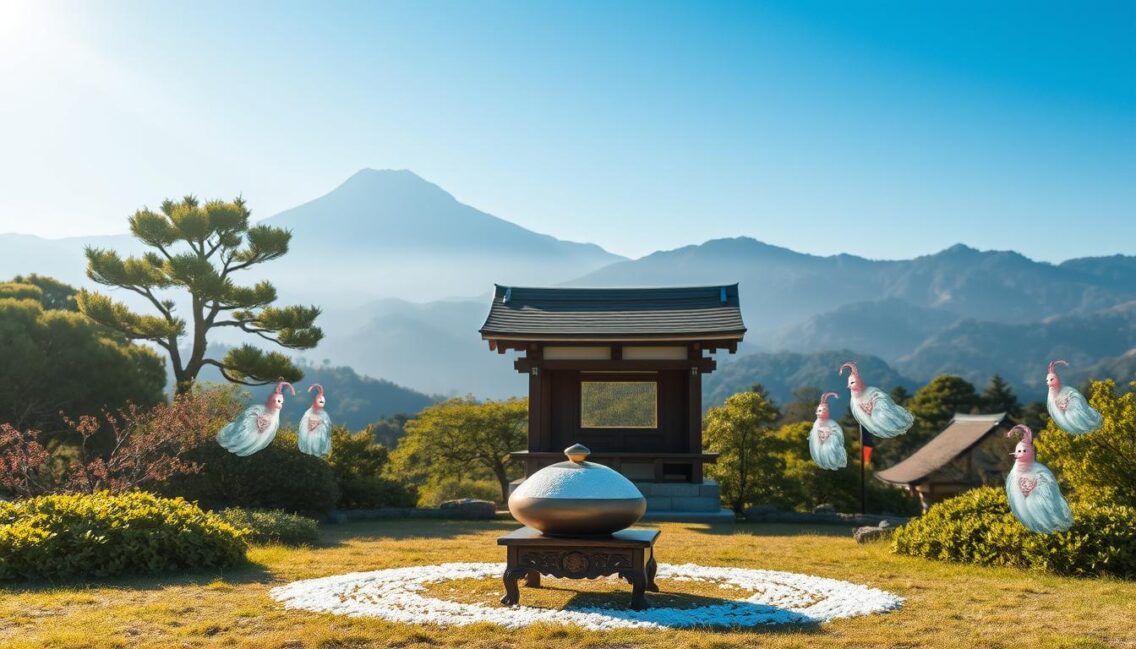Ward Off Spirits with Salt: Japanese Folklore & Protection

As I enter the dimly lit room, I feel an unseen energy around me. A small bowl of coarse salt sits on the windowsill. It acts as a silent guardian against the invisible forces in the shadows.
This humble mineral is highly valued in Japanese folklore and spiritual traditions. It is seen as a powerful protector. It can ward off evil spirits and cleanse the air of negative energies.
Throughout history, salt has been important in cultures and religions worldwide. It symbolizes protection, purification, and a connection to the divine. In Japan, salt is deeply valued for its role in warding off evil spirits and maintaining harmony.
As we explore Japanese folklore and protection rituals, we’ll see the lasting importance of salt. It plays a key role in safeguarding the well-being of people, families, and communities.
Introduction: The Age-Old Use of Salt as a Spiritual Protector
Salt has been seen as a way to keep evil spirits away for ages. It’s used in many cultures and history for protection and cleaning. In old myths, salt was linked to purity and heavenly protection, believed to clean spaces and keep harm away.
This belief in salt’s power to protect us still exists today. It shows our ongoing interest in the supernatural and our need for safety in an unpredictable world.
Salt’s Role in Warding Off Evil Across Cultures
Salt’s role as a protector is not just in Japan. Many cultures worldwide use salt in their rituals and traditions. It’s seen as a way to purify, cleanse, and keep evil at bay.
From ancient Greece and Rome to the Middle East and the Americas, salt is valued for its protective qualities. It’s believed to keep evil spirits and negative energies away.
Significance of Salt in Japanese Folklore and Spiritual Practices
In Japan, salt is very important in spiritual practices. During the misogi, a Shinto ceremony at the start of the new year, people wash their bodies and are sprinkled with salt. This is to remove “spiritual dirt” and clear dead energy.
This belief in salt’s power to purify and cleanse is a big part of Japanese folklore and Shinto rituals.
Also, salt is used in other Shinto rites, like the tsuina-shiki ceremony. It’s mixed with fire and water for a strong cleansing ritual. Salt’s lasting importance in Japanese spiritual practices shows the deep respect for its protective and purifying qualities.
Ward Off Spirits with Power of Salt: Japanese Folklore and Protection, ritual
In Japan, salt is highly valued for its spiritual and purification powers. Salt rituals in Japan show a strong belief in its ability to keep evil away. It’s used in religious rites, cultural ceremonies, and daily life to symbolize purity and protection.
The misogi ceremony marks the start of the new year in Japan. It’s a Shinto purification practice where salt cleanses the body and spirit. Salt purification practices have been passed down for generations.
- In the misogi ceremony, salt is sprinkled over the body to symbolize the removal of impurities and the attainment of spiritual renewal.
- Salt is also used to purify sacred spaces, such as shrines and temples, by sprinkling it around the perimeter to create a barrier against negative influences.
Salt’s role in Japanese spiritual practices goes beyond Shinto rituals. In Buddhist traditions, it’s used in exorcism rites and ceremonies to expel evil spirits and restore balance.
The widespread use of salt for spiritual protection in Japan shows a deep cultural belief in its power. By embracing salt’s purifying and protective qualities, the Japanese people have made it a key part of their spiritual and cultural practices. This ensures its lasting legacy as a guardian against unseen forces.
The Cultural Traditions of Using Salt for Purification
In Japan, salt is key in many cultural and spiritual practices. It’s especially important in Shinto and Buddhist traditions. Salt has been valued for its power to purify and keep away bad energies.
Shinto Rituals and the Use of Salt in Misogi Ceremonies
In Shinto, salt is used to clean an area before important events. For example, before sumo wrestlers fight, salt is thrown into the ring to chase away evil spirits. The misogi ceremony at the start of the new year also uses salt to wash away old energy.
Salt’s Role in Buddhist Practices and Exorcism Rites
In Tibetan Buddhism, salt is used to fight off bad energies and protect against evil spirits. It’s believed to keep evil away. Throwing salt over your shoulder before entering your home after a funeral is a common practice to ward off evil spirits.
Across Asia, salt’s purification and protective powers are celebrated in many ways. This shows how important salt is in spiritual and religious practices.
Exploring the Scientific Explanations Behind Salt’s Protective Properties
Many believe salt can keep evil away, thanks to cultural and spiritual traditions. But science also supports this idea. Salt’s ability to soak up moisture is a key reason.
This moisture-absorbing quality might help salt pull in negative energies or toxins. In old customs, salt is placed in spots like doorways. It’s thought to clean the space of bad vibes, making it safer and purer.
Salt’s Antibacterial and Antiseptic Qualities
Salt is also known for fighting bacteria and germs. It’s been used to keep food fresh and clean wounds. This might explain why people think salt can protect against evil.
Salt is often seen as a symbol of purity and protection in many cultures. Salt’s ability to absorb moisture and fight germs gives a scientific reason for its protective powers.
| Scientific Property | Explanation |
|---|---|
| Hygroscopic nature | Salt’s ability to absorb moisture from the surrounding environment, which may contribute to the perception of it absorbing negative energies or toxins. |
| Antibacterial and antiseptic qualities | Salt’s historical use in preserving food and disinfecting wounds, which may be linked to beliefs in its power to cleanse and purify. |
Conclusion: The Enduring Legacy of Salt as a Spiritual Guard
Salt has been used for centuries to keep evil away. It shows our deep interest in the supernatural and our need for safety. Salt’s role in warding off evil is seen in both old stories and today’s beliefs.
Salt is important in many cultures, like in Japan’s Shinto rituals and among the Kalahari Desert’s indigenous people. It’s more than just a seasoning; it’s a symbol of deep cultural heritage. This shows how salt is a key part of our shared history.
Looking into salt’s folklore and spiritual uses, we see the power of cultural beliefs. It reminds us of our common quest for comfort, protection, and a connection to something greater. Salt’s legacy as a guardian continues to inspire us, showing its deep impact on our world’s cultural fabric.
FAQ
What is the significance of salt in Japanese folklore and spiritual practices?
Salt is very important in Japanese culture. It’s seen as a way to purify and protect. In Shinto rituals, like the misogi ceremony, salt is used to wash away bad energy and spirits.
How is salt used to ward off evil spirits in Japan?
Before sumo wrestling, salt is thrown into the ring. It’s believed to chase away evil spirits. Salt is also used in homes and businesses to keep them safe from bad energies.
What are the scientific explanations behind salt’s protective properties?
Salt can absorb moisture, which might help it absorb bad energies. It’s also known for fighting bacteria and germs. These facts could support its role as a protector.
How do other cultures and religions use salt for spiritual protection?
Salt’s protective use isn’t just in Japan. In Tibetan Buddhism, it’s used to push away negative forces. Some indigenous groups, like the Kalahari Desert people, also use salt in their spiritual practices.
What is the historical significance of salt as a spiritual protector?
The idea that salt can protect against evil goes back thousands of years. It’s linked to cleanliness and protection in many old stories. Salt’s ongoing use shows our ongoing interest in the supernatural and our need for safety.



